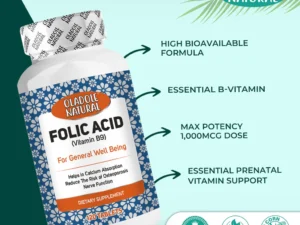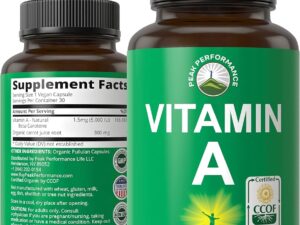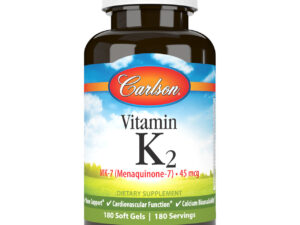Description
Riboflavin (Vitamin B2): The Powerhouse Vitamin Boosting Energy and Beyond
Riboflavin, also known as Vitamin B2, is a vital nutrient belonging to the B vitamin family. This water-soluble vitamin plays a crucial role in numerous bodily functions, acting as a key player in energy production, cell growth, and metabolism. Unlike fat-soluble vitamins, our bodies cannot store riboflavin, making it essential to regularly obtain it through diet or supplementation.
Why is Riboflavin Important?
Riboflavin functions primarily as a component of two major coenzymes: flavin mononucleotide (FMN) and flavin adenine dinucleotide (FAD). These coenzymes are involved in a wide range of metabolic processes, including:
- Energy Production: FMN and FAD are vital for the proper function of enzymes involved in the citric acid cycle (Krebs cycle) and the electron transport chain, the pathways responsible for generating energy from carbohydrates, fats, and proteins. This makes riboflavin essential for converting food into usable energy.
- Antioxidant Defense: Riboflavin helps regenerate glutathione, a powerful antioxidant that protects cells from damage caused by free radicals. This helps reduce oxidative stress and protect against chronic diseases.
- Cell Growth and Development: Riboflavin is essential for the growth and development of cells, particularly in the skin, hair, nails, and lining of the digestive tract. It is also important during pregnancy for the development of the fetus.
- Metabolism of Fats, Carbs, and Proteins: Riboflavin contributes to the efficient metabolism of fats, carbohydrates, and proteins, enabling the body to utilize these nutrients effectively.
- Vision Health: Riboflavin plays a role in maintaining healthy vision and may help reduce the risk of cataracts.
- Nervous System Function: Riboflavin supports the healthy functioning of the nervous system.
Sources of Riboflavin:
Fortunately, riboflavin is found in a variety of foods, making it relatively easy to incorporate into your diet. Excellent sources include:
- Dairy Products: Milk, yogurt, and cheese are good sources.
- Eggs: A readily available and versatile source.
- Lean Meats: Beef, pork, and poultry offer significant amounts.
- Organ Meats: Liver and kidney are particularly rich in riboflavin.
- Green Leafy Vegetables: Spinach, kale, and broccoli provide smaller but still beneficial amounts.
- Fortified Foods: Many cereals, breads, and other grains are fortified with riboflavin, contributing to overall intake.
- Mushrooms: Certain types of mushrooms, like shiitake, are a good source.
Riboflavin Deficiency:
Although riboflavin deficiency is relatively rare in developed countries, it can occur, especially in individuals with:
- Poor dietary habits: Insufficient intake of riboflavin-rich foods.
- Alcoholism: Alcohol can interfere with riboflavin absorption and utilization.
- Malabsorption disorders: Conditions like Crohn’s disease or celiac disease can hinder nutrient absorption.
- Certain medications: Some medications can interfere with riboflavin metabolism.
Symptoms of riboflavin deficiency, also known as ariboflavinosis, can include:
- Sore throat and inflammation of the mouth and tongue (glossitis).
- Cracks and sores at the corners of the mouth (angular cheilitis).
- Scaly, greasy skin inflammation (seborrheic dermatitis).
- Anemia.
- Light sensitivity.
Recommended Daily Intake:
The recommended daily intake of riboflavin varies depending on age, sex, and life stage. In general, adults need around:
- Men: 1.3 mg per day
- Women: 1.1 mg per day
- Pregnancy: 1.4 mg per day
- Breastfeeding: 1.6 mg per day
Supplementation and Precautions:
For individuals who have difficulty obtaining enough riboflavin through diet alone, supplements are available. Riboflavin is generally considered safe, and excess amounts are typically excreted in the urine. However, it’s always advisable to consult with a healthcare professional before starting any new supplement regimen, especially if you have underlying health conditions or are taking medications.
Conclusion:
Riboflavin (Vitamin B2) is an essential nutrient that plays a critical role in energy production, cell growth, and overall health. Ensuring adequate intake through a balanced diet rich in riboflavin-rich foods or through supplementation when necessary, can contribute to optimal health and well-being. So, power up your plate with riboflavin and reap the rewards of this vital vitamin!















Reviews
There are no reviews yet.